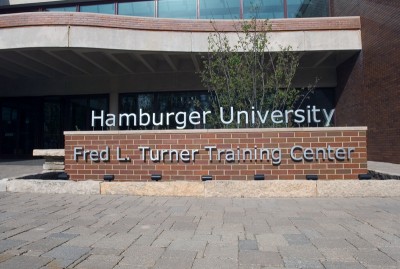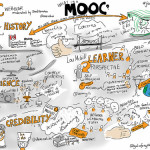Trend: Corporate U Employers Offering Just In Time Education To Workers
By Wired Academic on April 24, 2013
Domestic, Feature, Required, Universities & Colleges
Photo courtesy Starbucks
April 15, 2013
By Christopher Connell, The Hechinger Report
Arianna Suarez’s first job after emigrating from Cuba as a teenager was as a cashier at a Walmart in Hialeah, Fla. Thanks in part to college-level classes in business administration that the company provides, she’s since worked her way up to store manager.
“It’s all online,” Suarez says of the courses she takes. “You get credit for some Walmart training classes you take here for your job, and there are some classes you don’t have to take based on your work experience. It’s very attainable.”
It also provides Suarez and other workers with a jumpstart on college degrees toward which the credits may later apply. And it’s as good for the company as it is for the employees.
Rather than waiting for students with the right skills to be produced by conventional universities, which teach business subjects much more broadly, a dozen Fortune 500 companies including Walmart now offer their own in-house training classes that are eligible for college credit, in specific areas they need their workers to know now.
Mark Allen, a Pepperdine University business professor and author of “The Next Generation of Corporate Universities,” likens it to the kind of efficient, just-in-time logistics that keep costly inventories low until they’re needed. It’s also a reflection of companies’ impatience with the pace at which conventional higher education adapts to workplace needs.
“What companies like is just-in-time learning that gives somebody a skill they need at the time they need it,” Allen says. “What traditional universities do to a large extent is just-in-case learning.”
Walmart is far from alone in this field. In Seattle, Starbucks workers take courses called “Barista Basics” and “Barista 101.” And 5,000 McDonald’s managers and prospective managers from around the country spend a week each year at the chain’s Hamburger University at its Oak Brook, Ill., headquarters learning not how to flip hamburgers but how to sharpen their business and leadership skills.
“Selling hamburgers is what we do. But it’s the business philosophy and leadership that creates success,” says Shelly Hicks, who first came through Hamburger University’s doors when she was a restaurant manager in Nashville and now is one of the 16 “professors” at Oak Brook.
The Starbucks workers can get one and a half credits from City University of Seattle for each of the company’s two barista classes, and three credits apiece for higher-level management courses, and other colleges across the country also recognize the Starbucks training for academic credit through the American Council on Education’s College Credit Recommendation Service. McDonald’s store managers can earn up to 23 credits toward associate’s or bachelor’s degrees for the courses they take at Hamburger U, and higher-ups can earn as many as 27 credits; Hicks used hers toward a business degree and went on to get a master’s degree in adult education that helps her in her training role.
Most companies these days call the executives in charge of training and development “chief learning officers,” and there is even a Chief Learning Officer magazine. Some have their own campuses. Deloitte LLP, the financial services consulting company, uses its year-old Deloitte University, a $300 million, resort-like conference and training center on 107 manicured acres outside Dallas, in recruiting pitches, although the leadership development training provided there does not come with college credit.
In spite of all the academic lingo, however, employers are more concerned with meeting their immediate needs for a skilled workforce than with helping people already on the payroll earn college degrees.
Most corporate universities are extensions of human resource departments. Along with teaching such things as preventative maintenance, Jiffy Lube University imparts the parent company’s standards and culture to franchisees. The University of Farmers also focuses on corporate values and culture with Farmers Insurance Company’s agents.
These are not “kumbaya”-type team-building exercises—fall backward and trust that your coworkers will catch you—but practical, business administration classes or specialized skills training. At Starbucks, for example, after the barista training comes a course in cash and inventory control for shift supervisors. One of Walmart’s courses for employees is about time management, effective phone skills, and managing diversity. In corporate classrooms, students are learning the nitty-gritty stuff of business operations.
Still, businesses understand the added allure of college credit for those who may never before have set foot in a college classroom. Many arrange with local colleges and universities for employees to get tuition discounts or contract with accredited institutions to use their faculties for corporate training.
McDonald’s collaborates with Indiana’s Ivy Tech Community College, which counts 18 McDonald’s training credits toward associate’s degrees there, according to Matt Bell, president of Ivy Tech’s Corporate College. Kevin Clark, who heads up the McDonald’s education program, says 350 of the 5,000 managers who attend Hamburger University each year take the extra step of getting their transcripts approved by the American Council on Education so they can use the credits toward degrees at other accredited universities.
ACE’s College Credit Recommendation Service began in 1954 as a way for soldiers, sailors, and airmen to get academic credit for their military training. That arrangement continues, with each branch of the military issuing transcripts to service members for completing courses with the ACE’s stamp of approval, and was expanded in 1974 to include corporate training. For military and corporate customers alike, ACE dispatches faculty to training sites to judge whether the training passes muster for credit. Government agencies including the FBI and Internal Revenue Service, as well as the American Bar Association, labor unions, and hundreds of other private-sector organizations, also pay ACE to review and approve their courses. It’s up to colleges and universities whether to accept the credits, but Mary Beth Lakin, director of ACE’s College and University Partnerships, says 2,000 institutions did so last year.
Now corporate universities are speeding up the training process even more by responding to younger workers’ desire to use social media for professional development.
Those millennials, born since the late 1970s, “want to learn skills in a nontraditional way, on their mobile devices and tablets,” says Jeanne Meister, author of “The 2020 Workplace: How Innovative Companies Attract, Develop, and Keep Tomorrow’s Employees Today.”
A decade ago, Meister says, she was holding seminars almost weekly for companies interested in launching their own corporate universities. “Now the whole issue and conversation is about using social media for informal, continuous learning,” she says.
The corporate university is not just an American phenomenon. The Brazilian energy giant Petrobas enrolls 1,000 employees at a time in extended classes at Petrobas University in Rio de Janeiro and at satellite campuses in Sao Paulo and Salvador. The Indian technology giant Infosys sends all 15,000 engineers it hires each year to its showcase Global Education Center in Mysore for 23 weeks of classes. McDonald’s operates full-fledged Hamburger Universities in London, Munich, Sydney, Sao Paulo, Tokyo, and Beijing as well as Oak Brook.
Whether these adult students are running a McDonald’s in Nashville or a Walmart in Hialeah or becoming globetrotting IT consultants for Infosys, what matters most to their employers is that they bring new skills and enthusiasm to their jobs. And for some employees who have already risen through the ranks, making it possible for them to earn that college degree can be a powerful motivator.
“Think about yourself and where you are in your career and in your life right now,” Clark says he tells managers on their first morning at Hamburger University. Many “have been incredibly successful within the company” without college degrees, he says, “but for a myriad of reasons are now at a position in their life where they really want to pursue one.”
Those 23 or 27 credits they can earn at Hamburger U also give employees a jumpstart on earning a diploma.
“You don’t have to start from scratch,” Clark tells the managers. “Is this something you can take advantage of?”
Related Posts


Tips & Pitches
Latest WA Features
-
Online Courses Are Expanding, Along With Questions About Who Owns The Material
-
Why Size Matters: Consolidation Sweeps Across US Higher Ed
-
Trend: Corporate U Employers Offering Just In Time Education To Workers
-
Subterfuge & Skullduggery In The College Rankings Game
-
“Instreamia” Shakes Loose Moss By Launching Spanish Language Mini-MOOC
Domestic, Education Quality, For-Profit, Friend, Fraud, or Fishy, K-12, Legislation, Opinion, Personalized Learning, Regulatory, Required, Universities & Colleges - Apr 29, 2014 - 0 Comments
Michael Horn: NCAA March Madness Followed By April Blunder In Online Learning
More In For-Profit
- The Economy Is Forcing Tuition To Fall Rapidly At Private, For-Profit Colleges
- Kamenetz: Jeb Bush As Controversial Leader Of Aspen Task Force on Learning & The Internet
- Columnist Ryan Craig: The Best Of Times Could Return As For-Profit Edu Invests
- Bubble Analysis: Trace Urdan on Why This Era of Ed Investing Could Be Different
- A Blended Path? How American Honors Cuts Cost of Four Year Degree by Over a Third
Community Colleges Cost of Education Domestic For-Profit Required Student Loans Universities & Colleges
Cost of Education, Domestic, Education Quality, Friend, Fraud, or Fishy, Opinion, Personalized Learning, Required, Technology, Universities & Colleges - Jan 17, 2014 - 0 Comments
Online Education As A Postmodern Societal Response
More In Technology
- MakerBot Academy: A 3-D Printer In Every Classroom
- Michael Horn: A Look Behind The Curtain At How A MOOC Is Made
- Koller, Khan and Agarwal At The NYT’s Schools of Tomorrow Conference
- Video: New NESTA Report, Three Steps To Assess Digital Innovation in Education
- Norwegian Teens Publish Their Own Guide To Teaching and Learning In Web 2.0
Blended Learning Education Quality International K-12 Open Source Education Personalized Learning Required Technology
Domestic, Education Quality, For-Profit, Friend, Fraud, or Fishy, K-12, Legislation, Opinion, Personalized Learning, Regulatory, Required, Universities & Colleges - Apr 29, 2014 - 0 Comments
Michael Horn: NCAA March Madness Followed By April Blunder In Online Learning
More In Friend, Fraud, or Fishy
- Online Education As A Postmodern Societal Response
- Apple Tightens Its 94% Choke-hold On The Education Tablet Market
- Michael Horn: Why Obama’s Proposals Won’t Entirely Revolutionize HigherEd
- Columnist Ryan Craig: The Curious Case Of HigherEd Accreditation
- McGraw-Hill Executive Speaking About Big Data: “Don’t look at us, look at Joe Camel”
Domestic Ebooks Education Quality Ereaders Ethics Friend, Fraud, or Fishy K-12 Publishers & Curriculum Required Textbooks












Reply